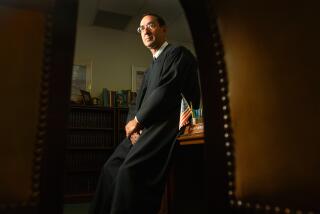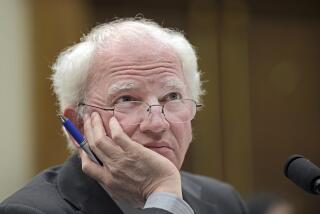Attorney Sanctioned for Criticizing Judge : Courts: Panel finds that civil rights lawyer Stephen Yagman tried to force jurist to take himself off cases. He could face reprimand, suspension or other discipline.
A special panel of three Los Angeles federal district court judges has ruled that Venice civil rights lawyer Stephen Yagman “impugned the integrity of the court” by accusing one of their colleagues of being anti-Semitic, drunk on the bench, “ignorant, dishonest . . . a bully and one of the worst judges in the United States.”
The judges also ruled that Yagman engaged in judge-shopping. They said he had criticized the judge in question, William D. Keller, “in an effort to force him to recuse himself” from Yagman’s cases.
In most of his cases, Yagman represents plaintiffs suing law enforcement officers on allegations of misconduct. Keller, a former U.S. attorney and a 1984 Reagan appointee, is generally viewed as sympathetic to law enforcement.
The panel’s ruling does not end the matter. Yagman still faces the possibility of a reprimand, suspension from practice in some federal courts or other discipline.
“It is a rare and unfortunate day when the judges of this district must sanction an attorney for conduct involving criticism of the bench,” said federal judges John G. Davies, Edward Rafeedie and David W. Williams in their decision.
“Robust debate regarding judicial performance is essential to a vital judiciary,” but “baseless factual allegations contribute nothing to judicial accountability and undermine public trust in the courts,” the judges added in the ruling, released Thursday.
“The panel finds no evidence that Judge Keller is in fact anti-Semitic or that (Yagman) had a reasonable basis for making such accusations,” the judges wrote.
The judges also said Yagman “has made no effort to explain his accusations that Judge Keller is dishonest or ‘drunk on the bench.’ ”
In the absence of supporting evidence, the judges said, “the panel presumes (that) these charges are false” and that Yagman lacked an objectively reasonable basis for expressing them.
Keller, through his secretary, said he had no comment.
Yagman blasted the ruling: “I am a Jew who believes a federal judge is an anti-Semite. And if friends of that judge who were appointed to the bench by the proven anti-Semite (Richard) Nixon and the odious (Ronald) Reagan attempt to harm me based on trumped-up charges for holding my belief, I cannot let that deter me. I’m a realist who holds a correct but unpopular opinion and who expects and who will bear the wrath of opponents whose righteousness is surpassed only by their lack of integrity.”
Williams was appointed by Nixon. Davies and Rafeedie were appointed by Reagan.
In their ruling, the three judges deferred making a recommendation on the “appropriate sanction” pending further briefs from Yagman and a special federal court disciplinary committee made up of 12 attorneys. Last year, the committee, citing the remarks about Keller, recommended that Yagman be barred from practicing in federal courts in seven Southern California counties from Riverside to San Luis Obispo, which make up the Central District of California.
Nearly a decade ago, Federal Judge Manuel L. Real imposed a $250,000 sanction on Yagman, which ultimately was reversed by the U.S. 9th Circuit Court of Appeals. Yagman, 49, also was suspended from practice by the state bar for six months in 1989.
Since the disciplinary committee filed the charges against him in December, 1992, Yagman has contended that he is the subject of a vendetta stemming from his longstanding feud with Real, who until recently was the chief judge of the Central District. Real appointed the 12-member committee that lodged the charges against Yagman.
In their ruling, the three judges cited as evidence statements Yagman made to a reporter from the Los Angeles Daily Journal, a legal trade paper; a letter he wrote to Prentice Hall, the publisher of a book of judicial profiles, and an advertisement Yagman placed in the Daily Journal seeking information from lawyers whom Keller had sanctioned.
More to Read
Sign up for Essential California
The most important California stories and recommendations in your inbox every morning.
You may occasionally receive promotional content from the Los Angeles Times.










